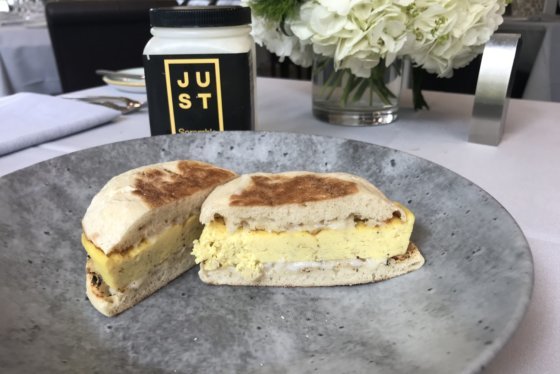When you think of a vegan dieter, you likely picture a health-obsessed animal rights activist who can’t stop talking about how great it is to go vegan — and who’s totally fine swearing off burgers and milk and a whole lot more. But in reality, going vegan doesn’t have to be an all-or-nothing approach. Here are five ways to ease into a vegan lifestyle.
Learn what being vegan actually is. The vegan diet, which tied for No. 19 on the U.S. News Best Diets Overall list, means eliminating all animal products from your diet — as in meat, fish, poultry, dairy and eggs. You’ll eat lots of fruits, vegetables, whole grains, nuts and legumes instead.
In the past, people thought vegans needed to plan their diets very carefully, some of which stemmed from the idea that plant foods couldn’t provide complete protein. Complete protein refers to the full array of essential amino acids, or building blocks of protein that our bodies can’t produce on their own, explains Dr. David Katz, director of the Yale-Griffin Prevention Research Center in Derby, Connecticut, and one of the U.S. News Best Diets expert panelists.
But it turns out that such amino acids are almost universally distributed in everything we eat. The difference between plant and animal sources is just concentration. And regardless, those in the U.S. get more than enough protein — even those living with food insecurity, Katz says. Protein comes from meat and poultry, but can also come from seafood, processed soy products, nuts and more.
Think about why you’re doing it. There are three main reasons to go vegan, Katz says: health, the environment and ethics.
Health-wise, going vegan may help you lose weight and limits your risk of heart disease, diabetes and cancer. Jill Weisenberger, a registered dietitian nutritionist and certified diabetes educator, cautions that losing weight on a vegan diet is a common misconception. She hasn’t observed someone switching to a vegan diet and losing weight without trying to lose weight, too. The truth is that vegans typically eat fewer calories, and combined with physical activity you’ll lose weight, though it’s up to individuals to maintain it.
“Anything we do to shift our diets to mostly plants is apt to be good for our health and good for the planet,” says Katz, who follows a predominantly vegan diet. Another reason people go vegan is to prevent animal exploitation. Vegan diets also require lower amounts of crops and water compared to diets involving meat and animal products, according to The Vegan Society.
Start off slow. Try going vegan one or two days a week, two meals per day, Katz suggests. “I think people should look beyond veganism as an all-the-time, absolute, every-day-every-meal proposition,” Katz says. He likes the idea that the food expert Mark Bittman offers: VB6, or eating vegan before 6 p.m. Think about being a vegan for breakfast and lunch and leave yourself the latitude of having seafood, poultry or something else for dinner.
Weisenberger, the author of “Prediabetes: A Complete Guide” and a U.S. News Best Diets expert panelist, adds that even if your goal is to be 100-percent vegan, you’re benefiting the entire time that you’re easing into it. She suggests identifying meals you already eat regularly that are healthful and vegan. Add these to your rotation more often, and if you frequently eat out, look for healthful balanced choices at restaurants — or find new restaurants.
Another tip? Celebrate your successes along the way — if you make it 80 percent of the way, that’s 80 percent awesome, Weisenberger says.
Supplement, supplement, supplement. There are a few nutrients we only get from animal foods, like vitamin B12. It’s widely recognized that strict vegans should supplement the vitamin, Katz says. He also suggests that supplementation doesn’t need to be a dirty word. For example, we all get vitamin D added to our diets through fortification — think milk — which is the same thing as supplementation but goes directly into food products instead of into an extra pill.
“Some people make a fuss about it — can a diet be complete if you need to supplement it?” Katz says. “Well, frankly, we all need to supplement our diets.”
Remember that vegan does not equal healthy. A diet being “vegan” doesn’t make it good or bad. A vegan diet can consist entirely of soda and cotton candy, Katz points out, and there are plenty of calorie-laden vegan desserts on the market. Like any diet, even if it’s strictly plant-based, issues of balance, variety and food choice remain crucial.
If you’re struggling to find recipes, talk to friends who follow the approach or join a Facebook group for a sense of support and camaraderie. Finding like-minded people is helpful, Weisenberger says. She also suggests taking a cooking class.
And going vegan doesn’t need to be as extreme as it may initially appear. “I think you’ll find that people who are trying to follow a vegan diet are going to be surprised by the options that are available to them because they’re looking for them,” she says.
What All Plant-Based Eaters Need to Know About Vitamin B12
11 Healthy Veggie Recipes That Prove Slow Cookers Are for More Than Meat
More from U.S. News
What All Plant-Based Eaters Need to Know About Vitamin B12
11 Healthy Veggie Recipes That Prove Slow Cookers Are for More Than Meat
Your Plant-Based Diet Needs These 10 Foods
How You Can Ease Into a Vegan Diet originally appeared on usnews.com








